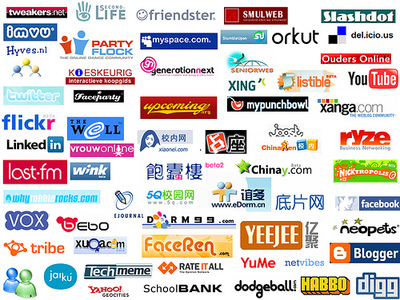Online social networks: Everywhere, yet nowhere
In the late 1990s, a large multi-national technology corporation, hoping to become a major force in online advertising, bought a small start-up in a sector that was believed to be the next big thing. That corporation was Microsoft and the start-up was Hotmail. Hotmail and Microsoft established web-based email as a must-have application for personal use. The addition of Hotmail to the Microsoft inventory promised to increase the companies online revenues that were being dominated by Yahoo!, Google and AOL amongst a host of others.
A decade later it was the turn of a much-evolved AOL to speculate with the purchase of a small and upcoming social networking website, Bebo, for $850m (£425m). This has raised a number of eyebrows since AOL has been a struggling web-portal after its merger with Time Warner, added to the fact that the real value of social networking has yet to be realised or understood.

Both deals in their respective decades offer to the casual observer a paradox of the Internet revolution. Whilst both email and social networking have the premise of being the next big thing which aides revenue generation, it is dangerous to assume that each service can standalone and generate revenue in its own right. Webmail, now over a decade old illustrates this perfectly. Microsoft, Yahoo!, Google and AOL all have their respective webmail services with advertisements stratefically placed to entice the user to click through, but these are a small part of the bigger networks. The offer of email, free archiving, address book and calendar is cheap to deliver, but its primary purpose is to keep the user engaged with the brand and its associated websites, making users more likely to visit the affiliated pages where advertising is more effective.
For instance, I am a fully signed up member of Google and access their email, chat, documents, analytics, webmasters, adsense, adwords, calendar and checkout applications, etc, some of which have advertising and all of which support the core Google search pages through branding. A similar example can also be said of Yahoo!. I again frequently use Yahoo!s MyBlogLog, Flickr and Upcoming services, which serve to re-inforce the Yahoo! brand and web portal.
Social networking will become a ubiquitous feature of online life, but that does not mean it is a businessPermalink to section titled Social networking will become a ubiquitous feature of online life, but that does not mean it is a business
From whence came webmail now comes social networking. The implicit values of social networking services such as MySpace, Facebook and Bebo have been increased by the big internet and media companies such as News Corporation, with their purchase of MySpace for $580m (£290m) in 2005 and Microsoft’s $260m (£130m) investment for a 1.6% share in Facebook, in late 2007 (valuing it at an enormous $15bn/£7.5bn). But valuing these online services so highly does not mean that there is a valuable revenue model; Facebook’s revenue for 2007 was a mere $150m (£75m). Sergey Brin of Google also admitted that the monetisation of their Orkut service and social networking in general was proving to be problematic (they also have a contractual agreement with News Corporation to offer advertising on their MySpace service).
Facebook has also been met with criticism and difficulty when trying to monetise its service with a project called Beacon. Facebook’s idea was to inform users’ networks whenever an item was purchased therefore creating what is in effect a recommendation system, or algorithmic word-of-mouth. Users rebelled and privacy advocates shouted loudly, the service was axed and Mark Zuckerberg, Facebook’s founder, was left to apologise for an innovative idea badly implemented.
Whilst social networking does have oportunities to make money, it is unlikely that it will be pots and pots of money. The value of the service, however, is not monetary, but as its genre suggests, it is social. We have already seen how people can connect to past and present friends, but a social networkings strength is in its ability to forge new relationships, business or personal. Social networking has made explicit the connections between people, which has lead to a whole ecosystem of applications built on their APIs which allow users to interact.
But should users really have to visit a specific website to be social?Permalink to section titled But should users really have to visit a specific website to be social?
I often comment that there is something profoundly wrong when people are forced to spend their lives updating their profile to keep in touch with their so-called friends. What happened to the good-old-fashioned telephone? Why don’t people simply arrange to meet up and go for a drink to keep in touch? Of course, with everyone’s increasingly busy lives, it is possible to argue that posting a tweet via twitter, posting an article on a blog or updating your Facebook profile, allows you to continue a real relationship with your friends, whilst not actually needing to see them every Friday or Saturday night. This is a good thing, right?
Another problem presented by today’s social networks is that they are an enclosed ecosystem, at least to users. Whilst Facebook and LinkedIn, in addition to a whole host of others, have provided APIs for developers to encourage them to interact with their services (this has been particularly successful with Facebook) the same cannot be applied to users. The various social networks, until recently, have been reluctant to allow users to pass data between competing services, afterall, this data is core to the success, or indeed failure, of a site. This is understandable since the networks’ huge valuations depend on the sites maximising revenues and page views, so they need to maintain a tight control. As a result, keen Internet users maintain a plethora of online accounts.
2008 will see a change in how people access social networksPermalink to section titled 2008 will see a change in how people access social networks

The opening up of social networks, lead by Google with their Open Social API, is set to bring about an evolution in this medium. This change is following the historical standardisation of popular services. First it was email with webmail, which in the early days was restricted to individual ecosystems, for example AOL and CompuServe, then it was instant messaging, with individual services provided by Microsoft, Yahoo!, Google, AOL and Skype.
Further developments include the Data Portability Working Group, whose mission is to put all existing technologies and initiatives in context to create a reference design for end-to-end data portability. In short, allow users to move their data around competing services. Others are pushing OpenID; a plan to create a single, federated online sign-on system that people can use to access many websites.

The opening of social networks is likely to accelerate thanks to the first tentative, yet bold, steps made by webmail; the first social network. As a technology, webmail has become old fashioned, but its younger sybling, the social network will revitalise not only webmail, but online communication and advertising. Through social intelligence, marketers and advertisers will be able to target adverts for items that we are more likely to want. This will not only boost the users online experience, but provide a more targeted revenue stream.
The fight for social networking dominance has been running for several years now, but it shows no sign of letting up.
Updated on: 22 March 2021